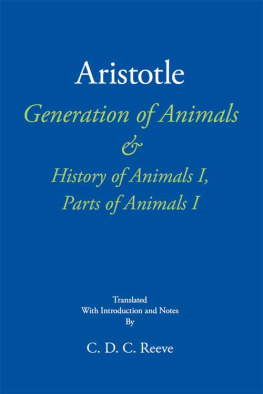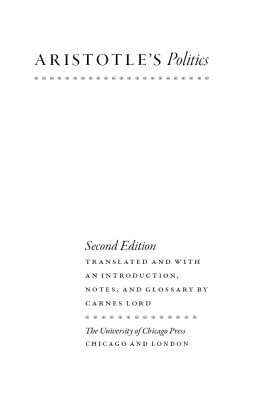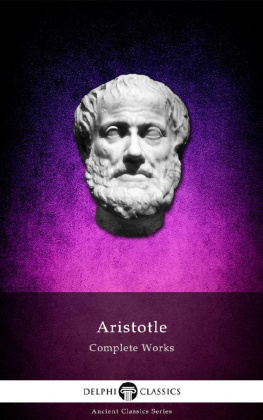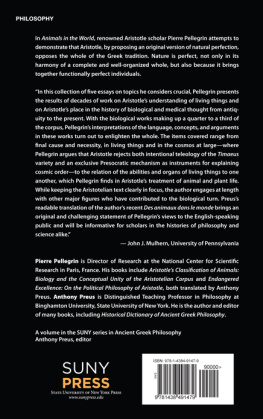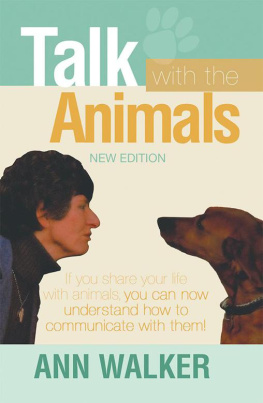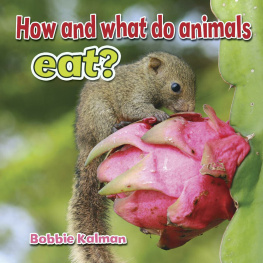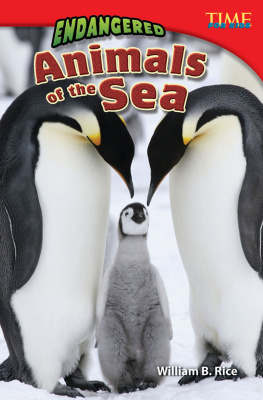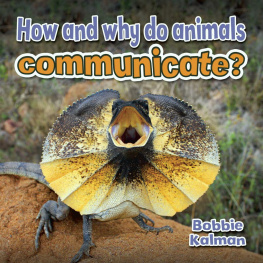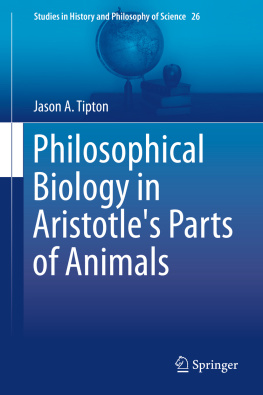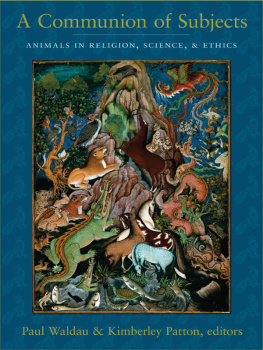Aristotle - Generation of Animals & History of Animals I, Parts of Animals I
Here you can read online Aristotle - Generation of Animals & History of Animals I, Parts of Animals I full text of the book (entire story) in english for free. Download pdf and epub, get meaning, cover and reviews about this ebook. year: 2019, publisher: Hackett Publishing Company, Inc., genre: Religion. Description of the work, (preface) as well as reviews are available. Best literature library LitArk.com created for fans of good reading and offers a wide selection of genres:
Romance novel
Science fiction
Adventure
Detective
Science
History
Home and family
Prose
Art
Politics
Computer
Non-fiction
Religion
Business
Children
Humor
Choose a favorite category and find really read worthwhile books. Enjoy immersion in the world of imagination, feel the emotions of the characters or learn something new for yourself, make an fascinating discovery.
Generation of Animals & History of Animals I, Parts of Animals I: summary, description and annotation
We offer to read an annotation, description, summary or preface (depends on what the author of the book "Generation of Animals & History of Animals I, Parts of Animals I" wrote himself). If you haven't found the necessary information about the book — write in the comments, we will try to find it.
Generation of Animals & History of Animals I, Parts of Animals I — read online for free the complete book (whole text) full work
Below is the text of the book, divided by pages. System saving the place of the last page read, allows you to conveniently read the book "Generation of Animals & History of Animals I, Parts of Animals I" online for free, without having to search again every time where you left off. Put a bookmark, and you can go to the page where you finished reading at any time.
Font size:
Interval:
Bookmark:
Aristotle
Generation of Animals
&
History of Animals I ,
Parts of Animals I
Aristotle
Generation of Animals
&
History of Animals I ,
Parts of Animals I
Translated
With an Introduction and Notes
By
C. D. C. Reeve
Hackett Publishing Company, Inc.
Indianapolis/Cambridge
Copyright 2019 by Hackett Publishing Company, Inc.
All rights reserved
Printed in the United States of America
22 21 20 19 1 2 3 4 5 6 7
For further information, please address
Hackett Publishing Company, Inc.
P.O. Box 44937
Indianapolis, Indiana 46244-0937
www.hackettpublishing.com
Cover design by Deborah Wilkes
Interior design by E. L. Wilson
Composition by Aptara, Inc.
Library of Congress Cataloging-in-Publication Data
Names: Aristotle. | Reeve, C. D. C., 1948 translator, editor. | Aristotle. De generatione animalium. English. | Aristotle. De partibus animalium. English. | Aristotle. Historia animalium. English.
Title: Aristotle Generation of animals & History of animals I, Parts of animals I / translated with an introduction and notes by C.D.C. Reeve.
Description: Indianapolis : Hackett Publishing Company, Inc., [2019] | Includes bibliographical references and index.
Identifiers: LCCN 2019018970 | ISBN 9781624668272 (paperback) | ISBN 9781624668289 (cloth)
Subjects: LCSH: ZoologyPre-Linnean works.
Classification: LCC QL41 .A725413 2019 | DDC 590dc23
LC record available at https://lccn.loc.gov/2019018970
ePub3 ISBN: 978-1-62466-877-7
Aristotle, De Anima . Translated, with Introduction and Notes, by C. D. C. Reeve.
Aristotle, Metaphysics . Translated, with Introduction and Notes, by C. D. C. Reeve.
Aristotle, Nicomachean Ethics . Translated, with Introduction and Notes, by C. D. C. Reeve.
Aristotle, Rhetoric . Translated, with Introduction and Notes, by C. D. C. Reeve.
Aristotle, Politics: A New Translation . Translated, with Introduction and Notes, by C. D. C. Reeve.
Aristotle, Selections . Translated, with Introduction, Notes, and Glossary, by Terence Irwin and Gail Fine.
Aristotle, Introductory Readings . Translated and Edited by Terence Irwin and Gail Fine.
Plato: Gorgias and Aristotle: Rhetoric . Translated, with Introduction, by Joe Sachs
For
Mark Bedau & Kate OBrien
Contents
The page numbers in curly braces {} correspond to the print edition of this title.
{xiii}
A reliable translation of any treatise of Aristotles needs to be accurate and consistent. No surprise there. It also needs to be accompanied by sufficient annotation to make it intelligible. Some of this can take the form, as it does here, of texts selected from other works by Aristotle himself, so that, while traveling through the region of the Aristotelian world the present treatises describe, the reader can also travel through other regions of it, acquiring an ever widening and deepening grasp of the whole picturesomething that is crucial, in my view, to understanding any part of it adequately or, perhaps, at all. But much commentary must simply be explanatory, clarificatory, and interpretative.
To make the journey as convenient as possible, footnotes and glossary entries are replaced by sequentially numbered endnotes, so that the information most needed at each juncture is available in a single place. The non-sequential reader, interested in a particular passage, will find in the detailed Index a guide to places where focused discussion of a term or notion occurs. The Introduction describes the book that lies ahead, explaining what it is about, what it is trying to do, how it goes about doing it, and what sort of audience it presupposes. It is not a comprehensive discussion of every aspect of Generation of Animals and its companions, nor is it, I should add, an expression of scholarly consensus on the issues it does discussinsofar as such a thing existsbut my own take on them. The same goes for many of the more interpretative notes. They are a place to start, not a place to finisha first step in the vast dialectical enterprise of coming to understand Aristotle for oneself.
Some readers will, I have assumed, be somewhat new to Aristotle, so I have tried to keep their needs in mind. But it is the resolute reader that Aristotle most repays, and it is such a reader, of whatever level of knowledge or sophistication, that I have tried to serve. Many different sorts of interests, moreover, converge on these extraordinary treatises, and I have tried to cater to more of them than editors and translators typically do. This is especially true of the rich trove of evidence they provide about Aristotles metaphysics (for example, his hylomorphism), his conception of a science, and his epistemology more generally.
I have benefited greatly from the work of previous translators and commentators, especially (in the case of GA ) that of David Balme, David Lefebvre, Pierre Louis, A. L. Peck, and Arthur Platt; (in the case of HA I) that {xiv} of Pierre Louis, A. L. Peck, DArcy Thompson, and Pierre Pellegrin; and (in the case of PA I) that of James Lennox, Pierre Louis, William Ogle, and A. L. Peck.
I thank Adam Woodcox for his careful reading of the typescript and for discussion of GA II 8; Abraham Bos for his corrections and for the stimulus provided by his work and correspondence; David Murphy for his very careful reading of the typescript and his expert advice on points of translation and doctrine; and Philip Bold for help correcting the page proofs.
I renew my thanks to KE, the first fraternity in the United States to endow a professorial chair, and to the University of North Carolina for awarding it to me. The generous research funds, among other things, that the endowment makes available each year have allowed me to travel to conferences and to acquire books, computers, and other research materials and assistance, without which my work would have been much more difficult.
Lastly, I again very warmly thank Deborah Wilkes for her enthusiastic support of my work and of the New Hackett Aristotle Series.
{xv}
Aristotle
Citations of Aristotles works are made to Immanuel Bekker, Aristotelis Opera (Berlin: 1831 [1970]), in the canonical form of abbreviated title (omitted when unneeded), book number (when the work is divided into books), chapter number, page number, column letter, and line number. An * indicates a work whose authenticity has been seriously questioned, ** indicates a work attributed to Aristotle but generally agreed not to be by him (similarly in the case of Plato). The abbreviations used are as follows:
| APo. | Posterior Analytics |
| APr. | Prior Analytics |
| Cael. | De Caelo (On the Heavens) |
| Cat. | Categories |
| Color. | On Colors** |
| DA | De Anima (On the Soul) |
| Div. Somn. | On Divination in Sleep (Ross) |
| EE | Eudemian Ethics |
| Fr. | Fragments (Rose) |
| GA | Generation of Animals |
| GC | On Coming to Be and Passing Away (De Generatione et Corruptione) |
| HA | History of Animals |
| IA | Progression of Animals (De Incessu Animalium) |
| Insomn. | On Dreams (Ross) |
| Int. | De Interpretatione |
| Juv. | On Youth and Old Age, Life and Death, and Respiration (Ross) |
| LI | On Indivisible Lines** |
| {xvi} Long. | On Length and Shortness of Life (Ross) |
| MA | Movement of Animals (Nussbaum) |
| MM | Magna Moralia* (Susemihl) |
| Mem. | On Memory (Ross) |
| Met. |
Font size:
Interval:
Bookmark:
Similar books «Generation of Animals & History of Animals I, Parts of Animals I»
Look at similar books to Generation of Animals & History of Animals I, Parts of Animals I. We have selected literature similar in name and meaning in the hope of providing readers with more options to find new, interesting, not yet read works.
Discussion, reviews of the book Generation of Animals & History of Animals I, Parts of Animals I and just readers' own opinions. Leave your comments, write what you think about the work, its meaning or the main characters. Specify what exactly you liked and what you didn't like, and why you think so.

